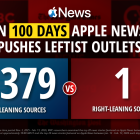Suppressing so-called “misinformation” and “disinformation” online about topics like climate change could whitewash the historical record.
That’s the core thesis of a piece published Thursday by American Enterprise Institute (AEI).
“[C]onsider now how future historians will view our societies if the collective digital record that has replaced paper diaries, letters, notes, and newspapers is purged of dissenting views,” wrote AEI nonresident senior fellow Bronwyn Howell. “If records of the views of climate change skeptics were removed to make it easier to implement changes, it may never be evident to those in the future that this was in fact a highly contentious issue that divided societies and influenced the choices made by political leaders as the complex issues unfolded.”
Howell specifically called out New Zealand Prime Minister Jacinda Ardern for her speech to the United Nations (UN) General Assembly in September. In the speech, Ardern justified censoring certain content around climate change and war, as well as content subjectively deemed “hateful and dangerous.”
“How do you successfully end a war if people are led to believe the reason for its existence is not only legal but noble?” Ardern told the multilateral body. “How do you tackle climate change if people do not believe it exists? How do you ensure the human rights of others are upheld, when they are subjected to hateful and dangerous rhetoric and ideology?”
Scrubbing the internet of objectionable views “would create a false and misleading impression of our life,” Howell wrote. “Ironically, removing supposed disinformation in the present creates misinformation in the future.”
Howell hearkened back to the world’s long history of printed, hard-copy records of dissenting views and how the written word has enabled rich debate and disagreement about current events over time.
“This has informed historical discourse and understanding of the circumstances facing people and societies of those times,” she wrote. “From this, we know that, to a greater or lesser extent, all societies exist in a form of chaos, as there is never only one unanimous view held by all of their members.”
In addition to sanitizing history, suppressing content can unfairly lay the groundwork for individuals to retroactively claim to have shaped a viewpoint that is shown to be pivotal after the fact, Howell wrote, “because there is no record left that could reliably contradict this.”
Fast-forward to today.
Just like the Chinese Communist Party-linked TikTok, American-in-name-only companies Facebook and Twitter are working to thwart certain posts about elections, interfering with the American democratic process and potentially altering the course of history.
Big Tech companies regularly scrub social media of views they deem objectionable, and MRC’s CensorTrack database has documented over 4,500 total cases of censorship by these tech giants.
Conservatives are under attack. Contact your representatives and demand that Big Tech be held to account to mirror the First Amendment, provide transparency, clarity on so-called hate speech and equal footing for conservatives.









